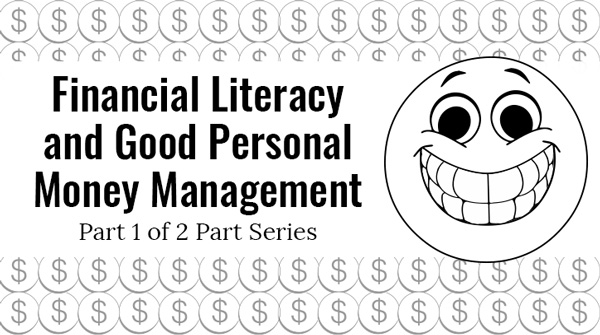 This is a two part series on the importance of financial literacy.
This is a two part series on the importance of financial literacy.
First, what does it take to be good at managing your own money? Most know how to earn money. That’s our education system – learning skills to step into a work career that makes money and be a well-rounded citizen. Although, the majority don’t know how to manage money. Here’s a practical example: many people are scared to invest their money in anything but mutual funds or index funds. They are scared because they have only been learning how to make money, not how to manage it. They may have even done well by paying down debt and in the meantime becoming more responsible with their money. But, how do you take the next step to become financially literate? Financial literacy might still be lacking even way after you’ve achieved financial freedom.
Let’s start with a story.
In my undergrad, I was all about learning how to be more creative. I was in a communications degree program where advertising, public relations, and graphic design classes were my core skills I was learning. I loved exploring the conceptual aspect of the right brain. And yet my first semester I started as a business major. But I took my first principles of business class, you know, stocks, bonds, general business principles and just wasn’t interested. I was confused as to how it was going to help me in the real world of business. I didn’t seem to be good at it and it wasn’t practical to me. Of course, later I got an MBA so I did eventually pursue more business education.
Principles of Accounting
But, when I was in my undergrad, I took a principles of accounting class as a core class and I absolutely loved it. It also seemed to come easily to me as it was very good at bringing the logical, reality of money into a conceptual practice of the balance sheet and assets vs liabilities – equal usage of left and right parts o the brain at the same time. It was not too different from my love of history and the use of maps and diagrams to bring a logical reality into the visual interpretation, the conceptual realm. It was bringing more clarity to the subject for me. As a result, I seemed to have an easier time learning it. My test grades were always better when I could visually interpret a subject. And that was the case with principles of accounting.
For many of my classmates in accounting, many of them who were pursuing an accounting major or loved math, they found it more difficult. I thought that was odd. To me the balance sheet, assets and liabilities, was perfectly understandable to me. I struggled with this reality, trying to understand why there was a gap from my perspective, who hated math to the math nerd, who hated principles of accounting? Maybe it’s because I had already gone through Crown Financial as a kid and learned the basics of Biblical money management? Principles of accounting is all about personal money management and stewardship. Regardless, I could relate to it very well.
Balance Sheet and Financial Literacy
As a student of personal money management, it is important to be financially literate. A big part of financial literacy is being able to explain the difference between assets and liabilities, and really grasp the difference between cash flow and income and how these can be implemented for your own personal financial stewardship.
Our education system focuses on developing skills – skills that essentially show us how to make money and earn an income. But it significantly lacks in how to manage it. Do you understand the income statement? Profit and loss statement? The balance sheet and the difference between an asset and a liability? Cash flow (as income) vs cash going out (expenses)? Most people have trouble managing their own money. This spills over into how they save and invest their money.
There is an aspect of financial aptitude that is necessary to learn in order to be faithful with money. You want to learn how to control it vs be controlled by it. That requires that you understand how personal money management works.
Investing and Financial Literacy Problems in America
Most programs that are basics on personal money management, and the philosophies in financial planning, banking, and financial accountants is about leveraging money through the use of debt. Essentially, you are still learning how to make money, not manage it. And yet, in America, we are now buying things with money we don’t have. That means the balance sheet is wrong.
You see, most certified financial planners and big time money managers would be able to tell you why your investing practices are bad. They use big words and talk about market volatility and risk. And yet, how they calculate risk is all wrong in the first place. This is why most people are bad at investing their own money. Because they are financially illiterate and confused. They don’t understand that if they take stocks out of the stock market when the stock market takes a dive, that this means they will lose money. That’s how the stock market works! You lose money if the economy is down for a period of time. What’s important to note here is, do you believe and see the numbers in favor of that business? When the company’s balance sheet looks good and their debt to cash ratio is healthy, you know they are financially healthy and will have the cash to pay their bills if the economy or their business takes a dip. At the same time, if you can look at the industry to understand that people still need those products and services, you can believe in the business.
It might be a little more complex than this – investing in individual businesses – but it is really more simple than we want to believe. We are smarter than we give ourselves credit for. It is simple, but not easy, really. You see, even in writing these words, I have an emotional reaction that is telling me I shouldn’t say this even when I know it to be true. There might be some areas that this doesn’t ring true for, but in that case, I would wonder if it is something that you should be investing in. Always remember, assets and liabilities. It’s that simple. There are certain principles you must understand and you must invest in what you understand. And you must be patient. These are a crucial part of being financially literate particularly in a society that clings to the media’s interpretation of current events. Turn off your tv, they are trying to dramatize every situation to get you to watch.
To know how to manage money requires skill in principles of accounting, how a business makes money and loses money, the balance sheet, and what true personal money management assets could look like: stocks, bonds, businesses that make money for you, income-generating real estate, intellectual property and other items that appreciate in value.
Don’t be someone that simply gets out of debt and then saves, or gets out of debt and invests in all encompassing mutual funds and investment funds that invest in ‘the economy’. Have you watched the news lately? Our economy needs help. Diversification is not investing in the whole economy, that is being scared. Be confident, focus on businesses. I want you to thrive. You need to learn how to be financially literate. Here are a couple of books to get you started:
- Rich Dad, Poor Dad by Guy Kawasaki
- Any basic books in understanding financial statements and balance sheets
Read financial literacy part 2. Because you need a little bit more to understand the full picture!
